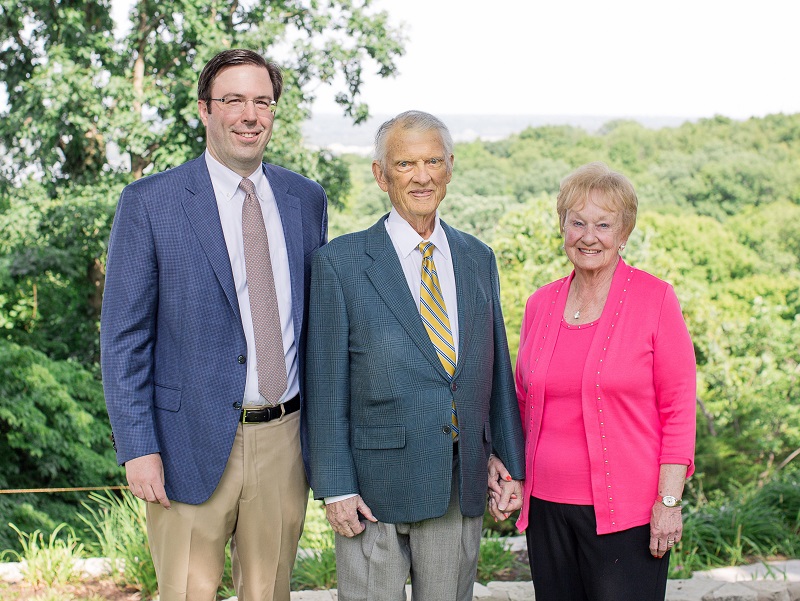“Jokingly, I told Dr. Matlaga that if he’s successful, he’ll put himself out of business.”
Gerald "Jerry" Stephens Donor and longtime Brady Institute Advisory Board member
Johns Hopkins UniversityEst. 1876
America’s First Research University
When Gerald “Jerry” Stephens met Hopkins urologist Brian Matlaga several years ago, he was in pain. A lot of pain.
“He took a six-centimeter stone out of me,” Stephens recalled in a July 2018 interview. “I’d been suffering for almost a year, and my life changed after that. It was incredible.”
Not long after the surgery, Stephens approached Matlaga with all sorts of questions about his work and research about stone disease — and an offer to help. So began a partnership that became a friendship, and a friendship that became a legacy. Shortly before his death in August, Stephens and his wife, Helen — who’d already endowed a professorship that Matlaga holds — made a gift to establish the Gerald D. and Helen M. Stephens Center for Stone Disease in The James Buchanan Brady Urological Institute at Johns Hopkins Medicine. Matlaga will serve as the center’s inaugural Stephens Director.
“Nobody knows what causes stones to actually occur — it could be a lot of things. If we knew more, something could be done to prevent them,” Stephens said. “That’s what we hope will come of this center, and I’m quite sure we’ve got the right people to do it.”
The Stephens Center creates a permanent foundation for work Matlaga began after receiving the Gerald D. and Helen M. Stephens Professorship in 2015. Funds from the chair have helped Matlaga partner with other investigators to identify outside-the-box approaches to improve stone treatments. For example, his work with Dan Stoianovici, director of the Urology Robotics Lab, enabled them to better understand the kidney and bladder stones Hopkins urologists were operating on.
“[Through the endoscope camera] you can see the stone, but there really isn’t any way at present to better characterize it than that,” he says. “The Stephens’ support helped us partner with Stoianovici’s team. Through this partnership the team has been able to come in and write computer code that takes data from the images we’re getting, and allows an analysis of it in order to learn more about what we’re treating.”
“Jokingly, I told Dr. Matlaga that if he’s successful, he’ll put himself out of business.”
Gerald "Jerry" Stephens Donor and longtime Brady Institute Advisory Board member
One of the Stephens Center’s earliest goals is to collect this information into a master dataset that Matlaga and his colleagues can study. The goals: to predict why stones form, which people are most at risk, when stones are likely to form in these people, and how they can best be treated. It’s research that has the potential to impact millions — stone disease affects more than 10 percent of the United States’ population and is trending upward.
The center’s resources advance The Brady’s — and Johns Hopkins Medicine’s — teaching mission, too. Stephens Center fellows are trained not only to be exemplary surgeons but also advanced researchers. Matlaga stresses the latter education may be even more intensive than the first.
“We’re taking them beyond beakers and test-tube scientific training to interacting with engineers and computer scientists, which is a unique skillset,” Matlaga says. “These are training relationships that, outside of philanthropic support, we don’t have the freedom to otherwise develop.”
And philanthropic support is increasingly critical because research about stone disease has been historically underfunded when compared with other diseases, such as cancer. Gifts like those the Stephens made over several years give people like Matlaga the ability to ask and answer questions that aren’t being asked elsewhere, yet could lead to advances in medical care and improved quality of life for many people.
“Jokingly, I told Dr. Matlaga that if he’s successful, he’ll put himself out of business,” Stephens said.

Stephens’ wit — shared over meetings and dinners during the years of their friendship — is something Matlaga will miss about the longtime Brady Institute Advisory Board Member. He’ll also miss the wisdom Stephens shared about leadership gleaned from his experiences in the Korean War and as the founder and chief executive of several companies, including RLI Corporation, a nationwide specialty property and casualty insurance company.
“His experiences were so incredibly robust that it would have been incredibly valuable to still have him around to speak with,” Matlaga says. “We have a vision for what he wanted this center to look like — he told me the secret to success was to identify and hire the best people and give them all the support they need to do their job as well as they can. We are moving in that direction.”
Editor’s note: Gerald “Jerry” D. Stephens passed away on August 20, 2018. He was 86 years old and is survived by his wife of 52 years, Helen Stephens, four children, and seven grandchildren.
Interested in supporting innovative medical research like Brian Matlaga's at Hopkins?
Topics: Friends of Johns Hopkins Medicine, Johns Hopkins Medicine, Fuel Discovery, Promote and Protect Health